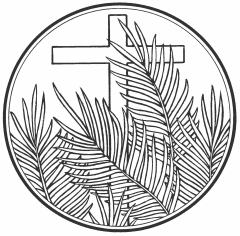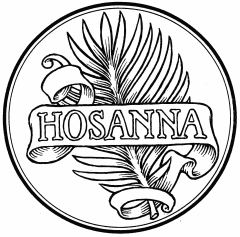Text: John 12:12-19
Grace, mercy, and peace to you from God our Father, and from our Lord and Savior, Jesus Christ, amen. The text for the sermon is the Palm Sunday Procession, which was read earlier.
The time is ever drawing near. Jesus has made the journey from Bethany to Jerusalem, a roughly 2-mile trek. When Jesus arrives, He doesn’t seek rest or refreshment after the journey. He proceeds to enter Jerusalem with great fanfare from the people. The people, here for the Passover, were likely making their preparations to celebrate the Passover in just a few days. But John sets up a scene for us similar to that of Matthew, Mark, and Luke: “The next day the large crowd that had come to the feast heard that Jesus was coming to Jerusalem.”
Just who is this “large crowd” that John speaks of? Just verses before, John reveals that there was a large crowd of Jesus who had learned that Jesus was there, and they came, not only because of Jesus, but also because of Lazarus, “whom he had raised from the dead.” This crowd, along with the Passover pilgrims, had heard about Jesus, potentially seen some of His miracles, maybe even been affected by His miracles. They came to see Jesus because they knew that He was different, special. It is echoed by their cries, “Hosanna! Blessed is he who comes in the name of the Lord, even the King of Israel!”
The people’s cries were not short-lived cries. John’s use of the verb implies that they kept shouting from the entrance of Jerusalem, on into the city, through the streets, and to the Temple. And what they shout is the same thing we shout today: Hosanna! It means “grant salvation” or “save, I pray.” Whether the people knew it or not, whether they believed it or not, that is precisely what Jesus had come to do.
Jesus enters Jerusalem and does exactly what Zechariah had prophesied, words that the people would have recognized:“Rejoice greatly, O daughter of Zion! Shout aloud, O daughter of Jerusalem! Behold, your king is coming to you; righteous and having salvation is he, humbled and mounted on a donkey, on a colt, the foal of a donkey.”
Here, standing before the people, is God’s prophecy fully revealed. Those gathered around shouting Hosanna, save us, are likely fellow believers in Christ and what He has taught about Himself the last three years. This was indeed good news for them, for their King, their Messiah, had arrived and they knew it! Or did they?
John throws in a bit of doubt for us, at least as far as the disciples were concerned: “His disciples did not understand these things at first….” Poor misguided and confused disciples! How could you not see what was taking place and know what this meant? Jesus had been teaching them for three years, preparing them for this very week, and when that week of Jesus’ Passion begins, it is lost on the disciples. But just as easily as it is lost on the disciples, it is lost on us as well. What is today all about? What is this week all about? For those within the Christian Church, we know that this is all about God keeping His promise of salvation for His creation; it’s all about the Son of God undoing sinful Adam’s Fall. It’s all about making right what was made wrong by sin.
You and I, we get that. We understand that. We look forward to that. But there are those that see today, this week, next Sunday, as just another day, another week. It means there’s a deadline on getting all the ingredients for the Easter ham or making dinner reservations for next Sunday, as kids go looking for eggs hidden by the Easter Bunny.
Fortunately for us, fortunately for the disciples, we get this, but not from ourselves. We get this by the Holy Spirit. The disciples fully got this, not when Jesus rode into Jerusalem, but after His resurrection. Despite being taught by Jesus for three years, despite being told by Jesus exactly what would happen, they still did not get it until after His death. Fortunately for us, we don’t have to wait until such time but this has been revealed to us through the Holy Spirit.
As the crowd gathered, they continued to bear witness to what they had seen and heard, not just when Jesus rode into to Jerusalem, but about His teachings and miracles, including the raising of Lazarus. This was indeed an important and powerful testimony to Jesus and who He is and what He came to do. But just as important as this event was, it fell on deaf ears with the Pharisees: “So the Pharisees said to one another, “You see that you are gaining nothing. Look, the world has gone after him.””
Here was a turning point for the Pharisees. They saw their power sipping through their fingers. Jesus had been a nuisance for the last three years, but as Jesus begins His Passion, it has become too much. If Jesus didn’t have to become silent before, He did now. But what they failed to realize is that putting Jesus to death, silencing Him so He could not disrupt things for them, this was going to make the biggest noise since creation itself. As we move closer and closer to the cross, the sound of a resounding victory gets ever louder.
It is interesting to note what the Pharisees say to one another.It might have been true at the moment, but would we agree that it is true today? Does the world really go after Jesus or does the world go after something or someone else? Does the world find its salvation in the cross of Christ or is salvation found somewhere else? Maybe a better question to ask is this: do you go after Jesus or do you go after something or someone else? We might find temporary comfort in what this world has to offer, but the comfort that this world gives is fleeting at best. It is here today but gone tomorrow. What Christ has done for you was here yesterday, it is here today, and it will be here tomorrow. The gift of salvation won for you by Jesus Christ on the cross was here yesterday, here today, and will be here tomorrow. We cannot say the same about the false comfort that we receive from the world.
As Jesus rides into Jerusalem, it is with the people on His mind – the sinner, the tax collector, the prostitute and adulterer, the reprobate, the Pharisee, the Jew and Gentile, the unbeliever – each and every person of creation. That is what Jesus is all about. As Jesus enters Jerusalem, it is for you. As He makes His way to the cross, it’s all about you.In service to you, the Savior suffers far more than physical torment and death. He suffers His Father’s judgment for your sins and for the sins of the world. He suffers hell there for you. “Greater love has no man than this, than to lay down His life for His friends,” He once told His disciples, and there is no greater love or service than His cross in your place. Do not miss, by the way, that the Father is serving you at the cross, too: for rather than judge you for your sin, He gives His Son in your place, for you.
Jesus would fulfill every sacrifice that God had demanded. He would live a sinless life as the Lamb without blemish. He would die the death that was meant for us; a death filled with suffering and eternal separation from God. Instead, we reap from His death on the cross. He gives to us His righteousness in exchange for our sins. We continue to sing with the Church, “Hosanna!” in the sure confidence that Christ has indeed come to save us. In the name of Jesus, amen. Now the peace of God that passes all understanding, keep your hearts and minds through faith in Christ Jesus, amen.

